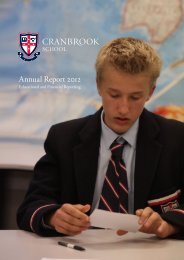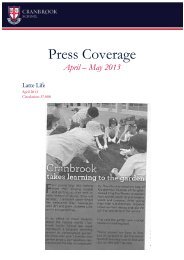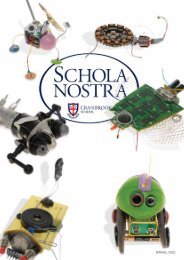View Here - Cranbrook School
View Here - Cranbrook School
View Here - Cranbrook School
Create successful ePaper yourself
Turn your PDF publications into a flip-book with our unique Google optimized e-Paper software.
Thursday, 30 May 2013 | Term 2, Week 5<br />
FEATURE<br />
For the lads<br />
by Alexander Bogaty and Eddie Najm<br />
What most schools don’t<br />
teach – Code<br />
Yesterday I spoke to a twenty-year-old who<br />
told me of the time they first saw a touch<br />
screen at the age of fifteen. They said it was<br />
like magic. Today, a sixteen-year-old told me<br />
about their first encounter with a laptop at the<br />
age of ten. Tomorrow I will see another baby<br />
manipulating an iPhone before it can even<br />
say ‘iPhone.’ You now pay for your sausage<br />
roll and chocolate milk using a piece of coded<br />
plastic, lunch money no longer an incentive<br />
for the New Age cyber bully. And, just for<br />
your information, there is a full colour, high<br />
definition copy of this article on the portal.<br />
The world is changing fast, and it’s about time<br />
you heard about Code.<br />
A man named Lee Crocket (who addressed<br />
the <strong>Cranbrook</strong> Senior <strong>School</strong> staff at their<br />
Professional Development Day at the start<br />
of this term) has formulated a theory on the<br />
changing society of the twenty-first century.<br />
He believes that schools need to adapt<br />
their teaching methods to keep up with the<br />
exponential evolution of technology in recent<br />
years. In 1990 it was estimated that students<br />
could expect to have four to seven careers in<br />
their lifetime. Today, the American Labour<br />
Bureau of Statistics indicate that for our<br />
generation, we can expect not four to seven,<br />
but ten to seventeen careers by the time we<br />
are thirty-five. It is predicted that due to our<br />
rapidly changing economy, the top ten jobs<br />
that will be in demand ten years from now<br />
have not even been invented yet, therefore<br />
drastic changes in schooling must be made to<br />
prepare students to fulfil these potential new<br />
career paths. Code is one avenue we need to<br />
explore.<br />
‘Everybody in this country should learn how<br />
to program a computer… because it teaches<br />
you how to think.’ – Bill Gates (net worth<br />
66.3 billion).<br />
Coding is about using computer technology<br />
to solve human problems. Over the next<br />
ten years in America alone, there will be 1.4<br />
million jobs in computer science, and only<br />
around 400,000 graduates will be qualified for<br />
those jobs.<br />
‘Even if you want to become a race car<br />
driver, or play baseball or build a house,<br />
all of these things have been turned upside<br />
down by software’ – Drew Houston – created<br />
Dropbox (net worth 400 million, aged 30)<br />
Coders talk about the profound moment when<br />
they first made a computer – a lump of metal<br />
and plastic – spit out a recognisable piece of<br />
information, simply by typing instructions in<br />
sequence. Rather than being so impressed by<br />
a computer’s processing capacity, or the clarity<br />
of an iPhone’s retina display, we should give<br />
more credit to those whose imagination built<br />
the product.<br />
‘Programing is the only thing in the world<br />
where you can sit down and make something<br />
completely new from scratch’ – Mark<br />
Zuckerberg – created Facebook (net worth<br />
13.3 billion, aged 28)<br />
Coding is like playing Lego, only it is limitless<br />
in its potential. It allows the design of pieces<br />
on any scale; of any degree of intricacy. The<br />
combination of these pieces produces an<br />
interactive system, which can perform any<br />
and every task at the click of a button. The best<br />
coders are the ones who can structure their<br />
program to cater specifically for our needs and<br />
desires.<br />
‘I first learned how to make a red circle and<br />
a green square appear on the screen’ - Elena<br />
Silenok – created Clothia (net worth 210<br />
million, aged 31)<br />
The YouTube video – ‘What Most <strong>School</strong>s<br />
Don’t Teach’ (directed by Lesley Chilcott)<br />
inspired this article – take a look at it. It<br />
explores some of the concepts described<br />
here and has an awesome segment on the<br />
reinvention of the Facebook office. Also on the<br />
video is a link to Code.org, a website which<br />
can teach you the basics of code. It’s really not<br />
as hard as you think.<br />
‘The programmers of tomorrow are the<br />
wizards of the future’ – Gabe Newell –<br />
created Valve (net worth 1.5 billion).<br />
5
















